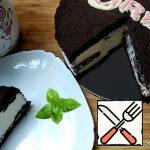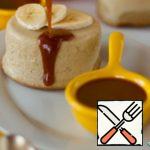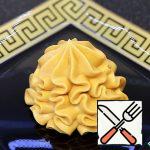In some recipes, it is recommended to beat the cream slightly, in other recipes (more traditional) they say that real Devonshire clotted cream should be heterogeneous, with layers of crust-foam.
I lightly whipped it up. Next time I will do it using traditional technology.
Devonshire is a wonderful place, one of the most picturesque corners of Britain.
So, the tables are covered with snow-white tablecloths, cups of the finest porcelain are arranged, tea is brewed, sandwiches and cakes are waiting in the wings. This is a ritual called “Devonshire tea”. You are sitting waiting at the table and here, they bring you a huge teapot, a milk jug, plump warm scones, strawberry jam and clotted cream. You pour a cup of tea, cut the warm scone in half, spread it with strawberry jam, put a spoonful of melted cream on top… You take a bite of this delicious delicacy and take a sip of fragrant tea… And at this moment you are immersed in the Victorian era…
Afternoon tea (afternoon tea) came into fashion in the middle of the 19th century and since then has not lost either love or popularity. Perhaps there is no other European country that so ardently likes to arrange tea parties. In England, tea is more than a drink. This is an important part of life, a special philosophy.
 Mary Barry’s Devonshire Scones Recipe
Mary Barry’s Devonshire Scones Recipe
 Honey Cupcake with Cream Cheese Cream Recipe
Honey Cupcake with Cream Cheese Cream Recipe
 Brazilian Cream on Condensed Milk and Lemons Recipe
Brazilian Cream on Condensed Milk and Lemons Recipe
 Cake with Mascarpone Cream Recipe
Cake with Mascarpone Cream Recipe
 Ice Cream Cake from Oreo Cookie Recipe
Ice Cream Cake from Oreo Cookie Recipe
 Mint Ice Cream in Strawberry Baskets Recipe
Mint Ice Cream in Strawberry Baskets Recipe
 Banana Pudding with Caramel-Cream Sauce Recipe
Banana Pudding with Caramel-Cream Sauce Recipe
 Cream “Whipped Caramel” Recipe
Cream “Whipped Caramel” Recipe
 Trilete with Caramel Sauce and Cream Recipe
Trilete with Caramel Sauce and Cream Recipe
 Banana Ice Cream with Peanut Paste Recipe
Banana Ice Cream with Peanut Paste Recipe
 Creamy-Raspberry Ice Cream Recipe
Creamy-Raspberry Ice Cream Recipe
 Pancake Cake with Curd-Cherry Cream Recipe
Pancake Cake with Curd-Cherry Cream Recipe